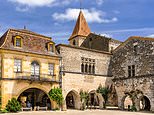
That Monpazier’s leading hotel – the Edward 1er – is named after our own Edward I is a reminder of the deep and lasting bonds between Britain and this captivating region of south-western France.
On ascending the English throne in 1272, Edward also inherited the vast Dukedom of Acquitaine – in which Monpazier is located – through his great-grandmother, Queen Eleanor. But he would have to fight to keep it. Philip IV of France decided his English cousins had been stomping on his turf long enough and, in readiness for the wars to come, built a string of fortified settlements – known as bastides – along the frontier of the disputed territory.
Not to be outdone, Edward set about constructing his own network of bastides. Monpazier, founded in 1284, is arguably the prettiest and remains the most intact.
The British were finally kicked out of Aquitaine in 1453, but recently they have been returning, now in peace and fraternity.
The bastide villages of the Dordogne have proved a major attraction not only for tourists, but also for second-homers and those looking to put down more permanent roots in France. Snootier French purists are often dismissive about what they see as the over-anglicisation of the region – Dordogne-shire, as they like to call it – but I experienced an open and cheerful spirit of symbiosis.
Living history: Neil Darbyshire explores the bastide villages of south-west France, including Monpazier (pictured), which has become home for many British expats
‘The charm of [Monpazier, above] and [the] surrounding area is a big draw,’ friend and expat Ian tells Neil, adding: ‘It’s very picturesque in gentle countryside’
Our hosts and old friends Julie and Ian, both retired teachers, bought a small holiday home here in 2007 before upgrading to an elegant stone villa in about an acre of land on the edge of town, where they took up full-time residence in 2019.
‘The charm of the village and surrounding area is a big draw,’ Ian says. ‘It’s very picturesque in gentle countryside, with warmer and drier weather than the North-East of England where we came from. The locals are friendly, patient and helpful – especially if you attempt the language.’
You don’t have to live here to appreciate its qualities. This is a remarkable place – a piece of living history yet with a contemporary buzz. It’s also just a 40-minute drive from Bergerac airport and two hours from Bordeaux.
Monpazier’s leading hotel, the Edward 1er (pictured), is named after Edward I of England, who founded the village in 1284
Ian says that Monpazier (pictured), founded in 1284, is ‘arguably the prettiest’ of the bastide villages and ‘remains the most intact’
Entry to the old town is through imposing towered gates, beyond which broad, low arches lead into an immaculately preserved market square. There are jolly cafes, patisseries, artisan bakeries and a weekly market selling clothes, wine, fish, cheese and local produce.
We dine at Chez Minou, a family restaurant specialising in regional dishes. My salad of duck gizzards, stewed, sliced and warmed in the oven, is so delicious I order another for lunch the next day in the larger town of Villereal. I also buy a tin of duck gizzard confit at the market to cook at home – but later discover that, like Retsina and Moroccan kaftans, it doesn’t really travel.
Our holiday is a lazy meander through the countryside, mooching around shops and markets, and eating and drinking too much. We visit the mighty bastide of Monflanquin, perched like a grand eyrie on top of a steep hill. Anyone thinking of attacking it in the old days must have had a death wish.
‘Our holiday is a lazy meander through the countryside, mooching around shops and markets, and eating and drinking too much,’ says Neil. Above, bread at a Dordogne market
Neil visits the bastide of Monflanquin (pictured), which is ‘perched like a grand eyrie on top of a steep hill’
For the more active there is canoeing at Domme, a leisure lake complete with beach and children’s facilities, and wild swimming at Limeuil.
Not having any children under 38 and with an aversion to freezing water, I opt for 18 holes at the pretty Lolivarie golf course near Belves. I team up with Greg, an ex-City trader, and Hilton, a retired accountant, whom I had met a couple of days earlier. Both came here for a more peaceful life, and it seems to be working.
They are so relaxed they let me win. Back in Monpazier we drink hoppy craft beer and eat burgers at Biere de la Bastide, owned by Hugh Davies, a smiley Englishman with Celtic genes and a love of rugby. He opened here five years ago and has built up a thriving business. Initially appealing mainly to visitors and expats, most of his staff and clientele are now French.
Above, canoeing at Domme, a leisure lake complete with beach and children’s facilities
‘It made sense to retire to France,’ he says. ‘This is a beautiful place and the local people have been beyond welcoming.’
The population of most bastides had been falling as young people moved away. So the injection of capital provided by tourism and expat immigration provides an important fillip to flagging local economies.
On a cycling tour of the bastide country in 1908, T.E. Lawrence (of Arabia) described Monpazier as ‘a little town that will quickly fall into ruin’. How wrong he was.
Source link
CHECK OUT: Top Travel Destinations
READ MORE: Travel News



